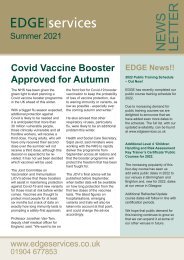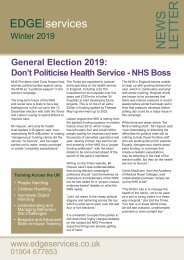EDGE Services Newsletter March 2018
EDGE Services Newsletter March 2018
EDGE Services Newsletter March 2018
You also want an ePaper? Increase the reach of your titles
YUMPU automatically turns print PDFs into web optimized ePapers that Google loves.
A Third Of Those With<br />
Dementia Missing Out<br />
On Care<br />
It is NHS policy that all those with a diagnosis of<br />
dementia should receive an annually-reviewed<br />
individual care plan but one of the UK’s leading<br />
charities, Age UK, reports that in excess of a third of<br />
those in England with such a diagnosis are failing to<br />
receive the care which they are due. Of the over-450<br />
000 people so entitled significantly less than 300 000<br />
had received either a new care plan or a review in the<br />
year to November 2017.<br />
Such care plans, the charity states, are “the gateway<br />
to follow-up support from the NHS” and are designed<br />
to offer support and adapt as the condition progresses.<br />
And, with the number of those with dementia expected<br />
to top a million within seven years, the current issues<br />
threaten the likelihood that people will be able to<br />
continue to thrive in the community as their condition<br />
deteriorates.<br />
“Our analysis suggests,” Age UK’s charity director,<br />
Caroline Abrahams, told The Guardian, “that many<br />
people with dementia are losing out on the NHS followup<br />
support they need and are supposed always to be<br />
offered, once they have received their diagnosis.” She<br />
went on, “As a result, they and their loved ones are<br />
missing precious opportunities to get help with living<br />
as well as possible with the disease. The absence<br />
of a care plan also means that people with dementia<br />
are not being signposted to services that really could<br />
improve their physical and mental health, and sense of<br />
wellbeing.”<br />
The charity went on to say that services offering<br />
support are of insufficient quality amidst concerns that<br />
the Government are failing to live up to Prime Minister<br />
Theresa May’ promises to enhance the “quality of<br />
post-diagnosis treatment and support for people with<br />
dementia and their carers.” Age UK’s report, however,<br />
suggests a range of actions which could yet play a<br />
significant role in the implementation of individual care<br />
plans such as specialist nurses, counselling and both<br />
horticultural or dance therapy. The report’s author,<br />
Kate Jopling, said that it, “sets out what people with<br />
dementia want, what’s been tried elsewhere, what<br />
evidence there is that it works.”<br />
Responding to Age UK’s claims of a shortfall in the<br />
implementation of care plans, a spokeswoman for the<br />
Department of Health and Social Care said, “We want<br />
to make this the best country in the world for dementia<br />
care and we therefore expect everyone with dementia<br />
to have a personalised care plan. NHS England data<br />
shows that over the last two years, more people with<br />
dementia are getting better access to support.”<br />
Spring <strong>2018</strong> <strong>Newsletter</strong> 9<br />
Blue Monday Trivialises Depression<br />
Blue Monday is traditionally thought to be ‘the most<br />
depressing day of the year’ - a day when people are<br />
feeling flat after Christmas, have racked up some debt<br />
over the festive season, or, are simply fed up with bad<br />
weather and long, dark evenings.<br />
But mental health charities and campaigners say this<br />
feeling of being generally low happens for many people<br />
at the beginning of the year, and doesn’t necessarily<br />
mean they are suffering from depression.<br />
Stephen Buckley, head of information at the charity,<br />
Mind, said: “There is no credible evidence to suggest<br />
that one day in particular can increase the risk of people<br />
feeling depressed and suggesting as such contributes<br />
to damaging misconceptions about depression,<br />
trivialising a potentially life-threatening illness.<br />
“One in six people will experience depression during<br />
their life. It can be extremely debilitating with common<br />
symptoms including feeling down, empty or numb,<br />
having no self-esteem, finding no pleasure in the things<br />
you usually enjoy or experiencing suicidal thoughts.<br />
“There are certain things that may contribute to<br />
people feeling down at this time of year, such as<br />
post-Christmas financial strains, broken New Year’s<br />
resolutions, bad weather and short daylight hours.<br />
However, depression is not just a one-day event and<br />
can happen at any time.”<br />
Mental health charities have grown more vocal in recent<br />
years about Blue Monday being used as a means<br />
of highlighting depression, because it trivialises the<br />
struggle that many depressed people experience daily.<br />
It also compounds the stereotype that depression isn’t<br />
very serious; that it is something which individuals<br />
should or even can just ‘snap out of’. The statistics for<br />
depression in the UK paints a very different picture.<br />
Mr Buckley said: “One in four of us will experience a<br />
mental health problem in any given year, which can<br />
occur at any time for a number of reasons.”<br />
Mr Buckley has advice for anyone who has serious<br />
concerns about feeling low, depressed or their mental<br />
health in general. He said: “If you are concerned about<br />
yourself or a loved one then seeking support is one of<br />
the most important things you can do.<br />
“Our website has information on depression including<br />
tips for helping yourself and guidance for friends and<br />
family. You might also find it helpful to talk to your<br />
GP, who can give you further information and discuss<br />
treatment options.<br />
“Going to see your GP might seem daunting but it could<br />
be the first step to getting the help and support that’s<br />
right for you.”<br />
Mind has also produced a guide to help people speak<br />
to their GP about mental health. You can visit mind.org.<br />
uk/findthewords or call the Mind Infoline on 0300 123<br />
3393 for more information.<br />
www.edgeservices.co.uk<br />
01904 677853

















